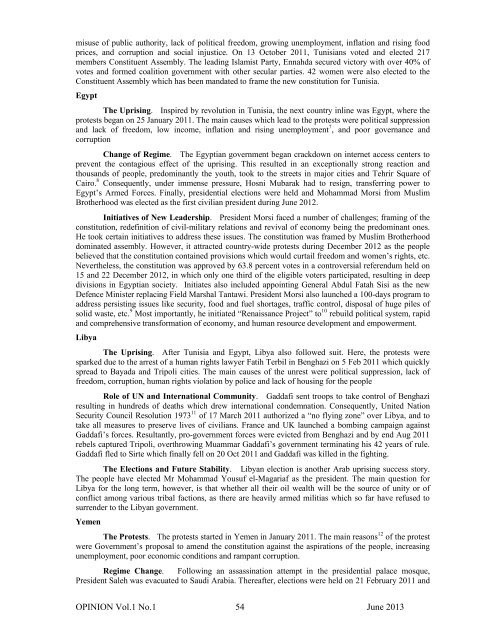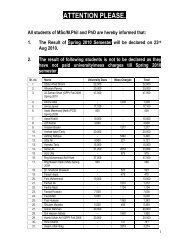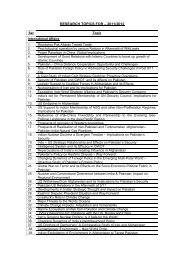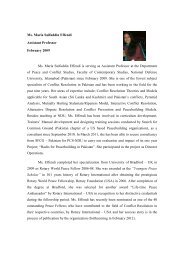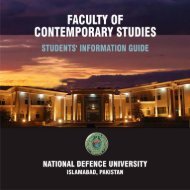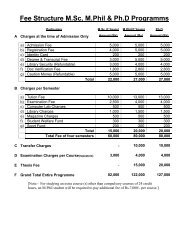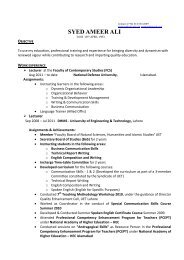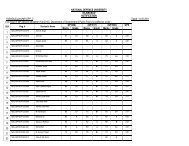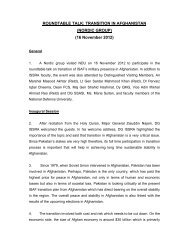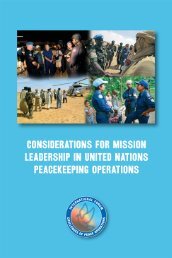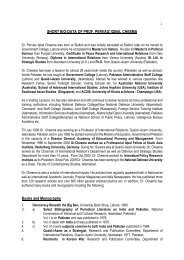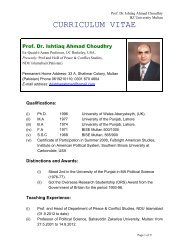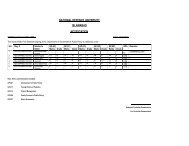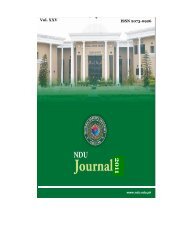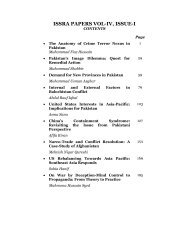OPINION Vol.1, No.1 June 2013 - National Defence University
OPINION Vol.1, No.1 June 2013 - National Defence University
OPINION Vol.1, No.1 June 2013 - National Defence University
Create successful ePaper yourself
Turn your PDF publications into a flip-book with our unique Google optimized e-Paper software.
misuse of public authority, lack of political freedom, growing unemployment, inflation and rising food<br />
prices, and corruption and social injustice. On 13 October 2011, Tunisians voted and elected 217<br />
members Constituent Assembly. The leading Islamist Party, Ennahda secured victory with over 40% of<br />
votes and formed coalition government with other secular parties. 42 women were also elected to the<br />
Constituent Assembly which has been mandated to frame the new constitution for Tunisia.<br />
Egypt<br />
The Uprising. Inspired by revolution in Tunisia, the next country inline was Egypt, where the<br />
protests began on 25 January 2011. The main causes which lead to the protests were political suppression<br />
and lack of freedom, low income, inflation and rising unemployment 7 , and poor governance and<br />
corruption<br />
Change of Regime. The Egyptian government began crackdown on internet access centers to<br />
prevent the contagious effect of the uprising. This resulted in an exceptionally strong reaction and<br />
thousands of people, predominantly the youth, took to the streets in major cities and Tehrir Square of<br />
Cairo. 8 Consequently, under immense pressure, Hosni Mubarak had to resign, transferring power to<br />
Egypt’s Armed Forces. Finally, presidential elections were held and Mohammad Morsi from Muslim<br />
Brotherhood was elected as the first civilian president during <strong>June</strong> 2012.<br />
Initiatives of New Leadership. President Morsi faced a number of challenges; framing of the<br />
constitution, redefinition of civil-military relations and revival of economy being the predominant ones.<br />
He took certain initiatives to address these issues. The constitution was framed by Muslim Brotherhood<br />
dominated assembly. However, it attracted country-wide protests during December 2012 as the people<br />
believed that the constitution contained provisions which would curtail freedom and women’s rights, etc.<br />
Nevertheless, the constitution was approved by 63.8 percent votes in a controversial referendum held on<br />
15 and 22 December 2012, in which only one third of the eligible voters participated, resulting in deep<br />
divisions in Egyptian society. Initiates also included appointing General Abdul Fatah Sisi as the new<br />
<strong>Defence</strong> Minister replacing Field Marshal Tantawi. President Morsi also launched a 100-days program to<br />
address persisting issues like security, food and fuel shortages, traffic control, disposal of huge piles of<br />
solid waste, etc. 9 Most importantly, he initiated “Renaissance Project” to 10 rebuild political system, rapid<br />
and comprehensive transformation of economy, and human resource development and empowerment.<br />
Libya<br />
The Uprising. After Tunisia and Egypt, Libya also followed suit. Here, the protests were<br />
sparked due to the arrest of a human rights lawyer Fatih Terbil in Benghazi on 5 Feb 2011 which quickly<br />
spread to Bayada and Tripoli cities. The main causes of the unrest were political suppression, lack of<br />
freedom, corruption, human rights violation by police and lack of housing for the people<br />
Role of UN and International Community. Gaddafi sent troops to take control of Benghazi<br />
resulting in hundreds of deaths which drew international condemnation. Consequently, United Nation<br />
Security Council Resolution 1973 11 of 17 March 2011 authorized a “no flying zone” over Libya, and to<br />
take all measures to preserve lives of civilians. France and UK launched a bombing campaign against<br />
Gaddafi’s forces. Resultantly, pro-government forces were evicted from Benghazi and by end Aug 2011<br />
rebels captured Tripoli, overthrowing Muammar Gaddafi’s government terminating his 42 years of rule.<br />
Gaddafi fled to Sirte which finally fell on 20 Oct 2011 and Gaddafi was killed in the fighting.<br />
The Elections and Future Stability. Libyan election is another Arab uprising success story.<br />
The people have elected Mr Mohammad Yousuf el-Magariaf as the president. The main question for<br />
Libya for the long term, however, is that whether all their oil wealth will be the source of unity or of<br />
conflict among various tribal factions, as there are heavily armed militias which so far have refused to<br />
surrender to the Libyan government.<br />
Yemen<br />
The Protests. The protests started in Yemen in January 2011. The main reasons 12 of the protest<br />
were Government’s proposal to amend the constitution against the aspirations of the people, increasing<br />
unemployment, poor economic conditions and rampant corruption.<br />
Regime Change. Following an assassination attempt in the presidential palace mosque,<br />
President Saleh was evacuated to Saudi Arabia. Thereafter, elections were held on 21 February 2011 and<br />
<strong>OPINION</strong> <strong>Vol.1</strong> <strong>No.1</strong> 54 <strong>June</strong> <strong>2013</strong>


